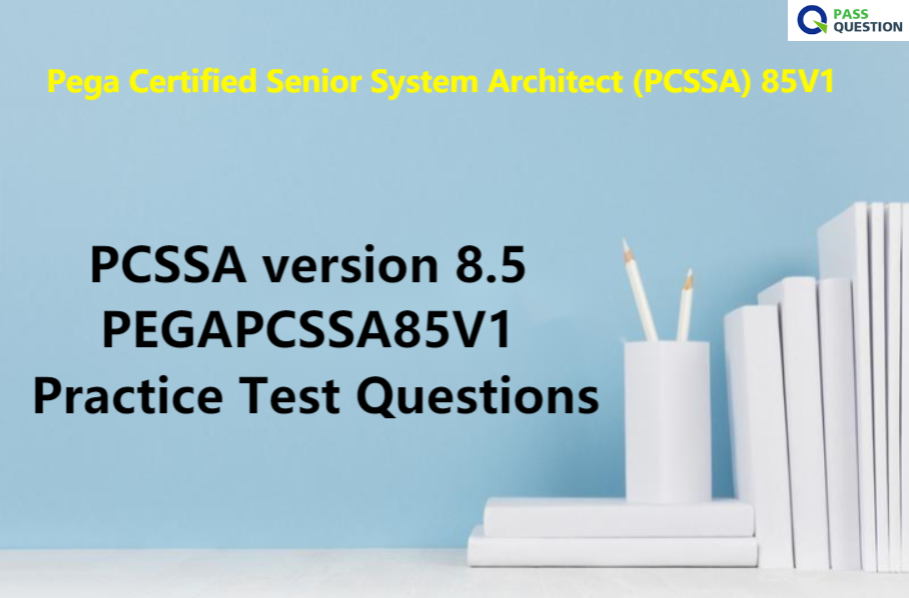PCSSA version 8.5 PEGAPCSSA85V1 Practice Test Questions
If you want to clear PEGAPCSSA85V1 Pega Certified Senior System Architect (PCSSA) 85V1 exam on the first attempt, then you can use our PCSSA version 8.5 PEGAPCSSA85V1 Practice Test Questions and start your preparation today. Our PCSSA version 8.5 PEGAPCSSA85V1 Practice Test Questions include multiple products including PDF files, practice exam. It will allow you to improve your preparation level so you can easily clear the Pegasystems PEGAPCSSA85V1 exam.We highly recommend you to go through all of the PCSSA version 8.5 PEGAPCSSA85V1 Practice Test Questions so you can easily get the best results.

PCSSA (Pega Certified Senior System Architect) Exam
The Pega Certified Senior System Architect (PCSSA) certification validates the ability to use Pega to design and build for reusability across multiple lines of business. It includes applying best practices, understanding application debugging and performance tuning, and addressing security/access requirements in an application. The PCSSA version 8.5 exam includes scenario questions, multiple choice questions and drag/drop items. If multiple answers are required, the text states how many responses are needed. Pega Certified System Architect (P/CSA) certification in any version is required to begin the PCSSA certification program.
The Pega Certified Senior System Architect (PCSSA) certification exam is Pega Certified System Architects who wish to increase their Pega skills. This certification validates your ability to use Pega to design and build for reusability across multiple lines of business.
Exam Information
PCSSA (Pega Certified Senior System Architect) Version 8.5 Certification Path:
CSA or PCSA Certification (any version)
Hands-on experience
Exam Code: PEGAPCSSA85V1
Type of Exam: 60 question exam
Length: 90 minutes
Passing Grade: 70% (Subject to change without notice)
Language: English
Retirement Date: November 30, 2021
Exam Topics
Application Development (17%)
- Enterprise Class Structure: Implementation and framework layers
- Understand the rule resolution process; Adjust rule availability
- Identify how circumstancing affects application behavior
- Circumstance rules on a single variable or multiple variables
- Differentiate between a queue processor and a job scheduler
- Identify the role and elements of activities in case processing
- Promote rule reuse with relevant records
- Review Log Files: Distinguish system events and performance events
Case Management (17%)
- Differentiate between work groups and organizational structures
- Configure parallel processing for cases
- Manage concurrent case access; Locking strategies
- Configure flow action pre- and post- processing
- Extend service-level agreement configurations
Data and Integration (17%)
- Configure Field Values
- Validate data against a pattern
- Identify use cases for Keyed Data Pages
- Exchange data with other applications
- Manage integration settings
- Address integration errors in connectors
User Interface (7%)
- Create and customize Pega Web Mashups
- Configure Pega Web Mashup authentication
Reporting (6%)
- Design reports with multiple sources; associations and joins
Performance (10%)
- Measure System Performance; use of performance-related tools
- Debug system performance
Security (11%)
- Distinguish between role-based and attribute-based access controls
- Identify the role of access control policies in securing an application
- Organize and manage case attachments
Deployments (10%)
- Identify the role and impacts of application versioning; Use of ruleset skimming
- Configure and validate application rulesets
- Branch rulesets for parallel development
- Migrate an application; Use of product rules
Mobility (5%)
- Differentiate between the delivery options for mobile devices
- Design applications for mobile use; use of certificate sets
- TOP 50 Exam Questions
-
Exam
All copyrights reserved 2025 PassQuestion NETWORK CO.,LIMITED. All Rights Reserved.

